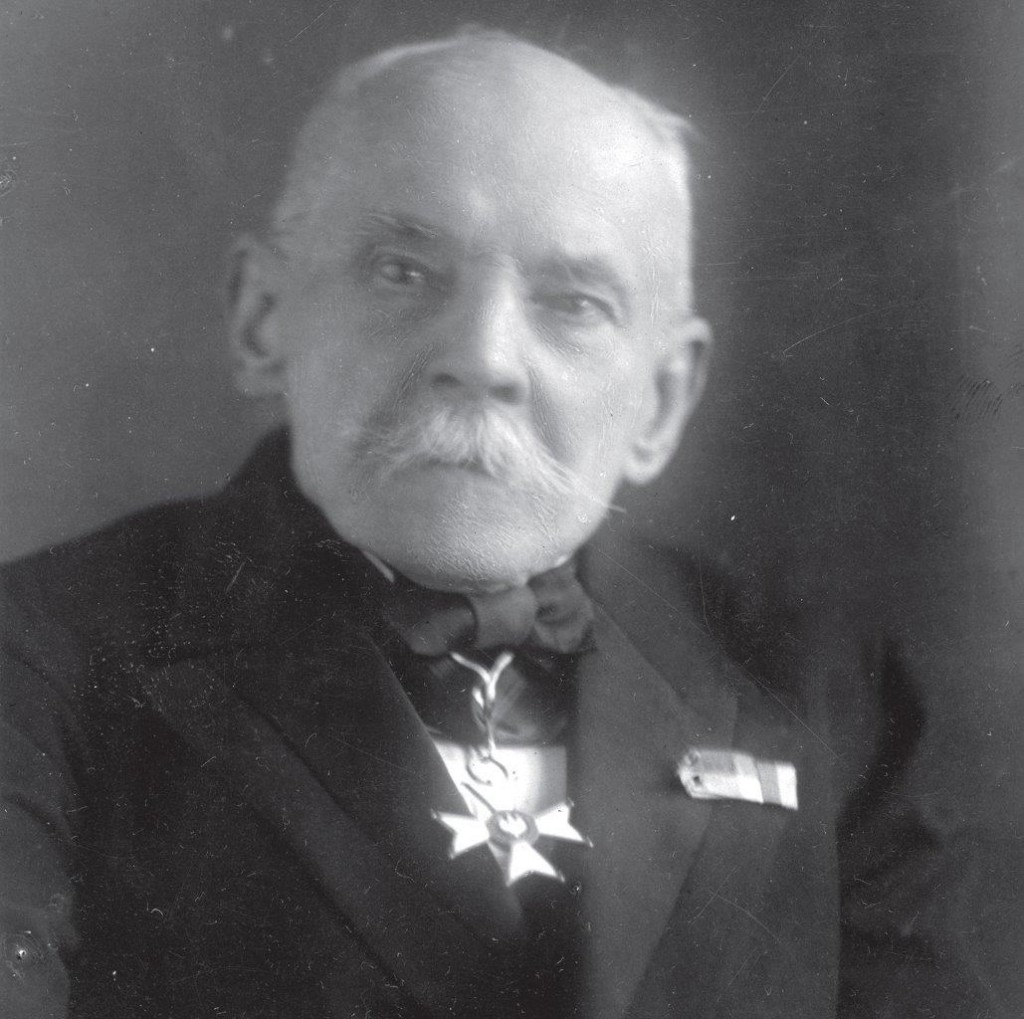Wojciech Biechoński (1839–1926) – Insurgent, oilman, local government member

“Those pioneers, being neither geologists nor technicians, still hit the jackpot for the oil industry in Galicia …” (“Wiadomości Naftowe” 1968. No. 2)
Secretary of the National Government during the January Uprising
Wojciech Biechoński was born in 1839 to a family of landowners in Kielce, and died in Lviv in 1926. In 1857 he graduated from the Higher Real School in Kielce, and later from the Polish Military School in Genoa and Cuneo. He also studied economics at the universities of Heidelberg, Leipzig and Vienna. When the January Uprising broke out, he returned to the country as an officer cadet. He took part in the battles for control over Miechów and in the Battle of Pieskowa Skała under the command of General Langiewicz. In October 1863, he became secretary of the insurgent National Government.
Financier and manager
In 1868, 29-year-old Biechoński settled in Gorlice, where he took the post of the head of the peasants’ land bank. Both his beliefs and his education made him a huge supporter of cooperative endeavours, so he founded the first Lenders’ Association in Galicia, the oldest credit union, over which he presided for 32 years. This institution had a very positive impact on the economic and social relations of the city and the district (powiat in Polish). In 1874 he was elected the president of the Union of Economic and Commercial Associations in Lviv.
The mayor of Gorlice
During the years 1887-1902 he held the position of the mayor of Gorlice. At that time, he strived to build a railway from Gorlice to Bardejov, streamlined the city budget, purchased land for the city park with his own means, founded schools, and built a hospital. Biechoński’s contributions to the development of the oil industry in the district are also invaluable. He included his thoughts on this topic in the book Rzut oka na przemysł górniczy naftowy w Galicji (A glance at the oil mining industry in Galicia).
Views on legal changes in oil mining
In his book he presented the difficult condition of Polish oil mining at the time and formulated a thesis whereby accelerating the development of the industry was contingent upon amending the mining law that was then in force:
“The Diet Resolution of 1861, gaining the approval of the Government, which henceforth excluded rock oil, if used for lighting, from being subject to the mining law, creates a completely new situation and instead of upholding this young sector of national mining, it undermines it in a radical way, because the inconvenience and the lack of any data supporting the search for kerosene-yielding oils has been compounded by highly detrimental competition from a huge number of scarcely equipped enterprises – in terms of material resources and intellectual prowess – which are entitled to search wherever the arrangement with the landowner has made it possible. ”
The law at the time gave landowners the right to commission drilling to amateurs and facilitated speculation in the real estate market. During the time of Biechoński’s activity, according to the Galician Oil Act of 1886, oil deposits were part of land whose owner regulated the exploitation through bilateral agreements with third parties selected by them. At the same time, they reserved a certain percentage of extracted resource for their own use. This percentage was called “gross”. At that time, the institution of the so-called field industrialist was established. A field industrialist was an intermediary between the owner of the land and the entrepreneur mining oil. This opened the door for speculation. A field industrialist, buying rights to extract oil from the owner of the land for resale, dictated additional conditions to the entrepreneurs who wanted to drill: for example, increased “morgowe”, which was a charge per a historical measure of land called “morga”, further gross percentages and other liabilities.
An additional problem was the fragmentation of ownership of oil companies. There were no supervisory boards, and the companies could not develop, because the numerous small shareholders had only their own interest in mind and often, striving to implement it, acted to the detriment of the company.
Postulated by Biechoński inclusion of rock oil under the existing mining law allowed financially weak, but numerous companies to search for rock oil if they entered into an agreement with the land owner.
The changes postulated by Biechoński only came into force in the times of the Second Polish Republic, one year after his death in 1927. At that time, the Oil Act came into force – the right to extract oil and natural gas subjected to the so-called will of the miners. This meant, in practice, that oil deposits were now at the disposal of the government through the state mining authorities. The owner of the deposit was not the land owner, but the person receiving the title to mining property from the government. In practice, this meant that the right to extract oil was received by an entrepreneur who had adequate capital and expertise.
Distinguished innovator and petroleum entrepreneur
Shortly after arriving in Gorlice in 1874, Biechoński became the leader of the oil company in Męcin possessing 10 drilling shafts. At that time, in all the mines nearby Gorlice the oil wells were dug by hand. Only in Biechoński’s company, according to Edward Windakiewicz in Rock oil and earth wax in Galicia (Olej i wosk skalny w Galicji), “there is a 10 hp steam machine that can drill 3 holes at a time, and then pump oil”. Biechoński later run the company together with Eufrozyna Dobrowolska, together they had 28 shafts and employed 51 people.
In 1923, on the 60th anniversary of the January Uprising, the Polish government awarded him the Polonia Restituta award, and the University of Lviv granted him the title of the doctor of Law honoris causa.
Inspirations:
- Biechoński Wojciech [Biogr.] [in:] Wielka Encyklopedia PWN. Warszawa 2001 Vol. 4 p. 28.
- Biechoński Wojciech, Rzut oka na przemysł górniczy naftowy w Galicji (A glance at the petroleum mining industry in Galicia), 1886
- Gucwa Aleksander, Przemysł naftowy Męciny Wielkiej (The oil industry of Męcina Wielka), in: Sękowa.info
- Pabis Tadeusz, Śladami gorlickich naftowców (Trails of Gorlice Oilmen), Nowy Korczyn 1996.
- Wojciech Biechoński /1839-1926/ współtwórca polskiego górnictwa naftowego (co-founder of Polish petroleum mining industry), „Wiadomości Naftowe” 1968, pp. 47–48.
- Pietrusza Józef, Myśl społeczno-polityczna czołowych twórców polskiego przemysłu naftowego w XIX w. (The social and political views of the premier founders of Polish industry in 19th century), „Wiadomości Naftowe” 1964, No. 4, pp. 103–104
- Windakiewicz Edward, Olej i wosk skalny w Galicji (Petroleum and earth wax in Galicia), Lwów 1875
Source of the photos: National Digital Archives

